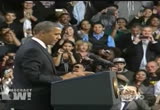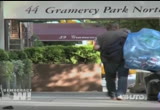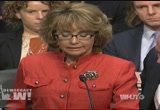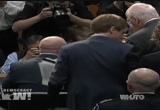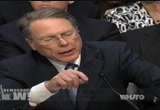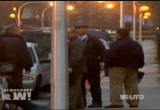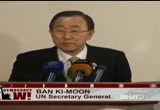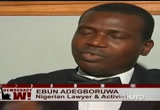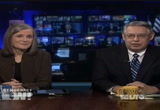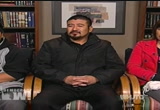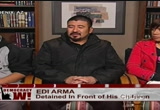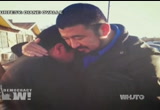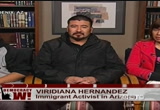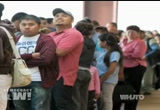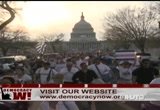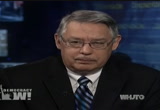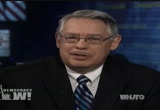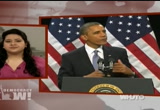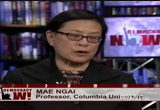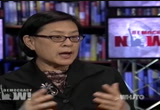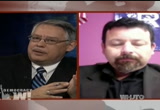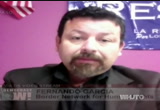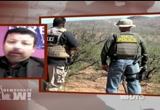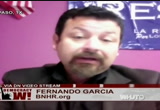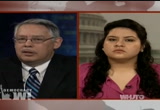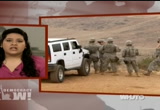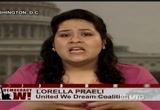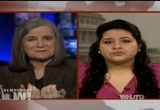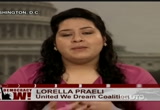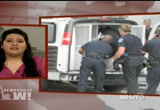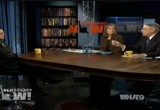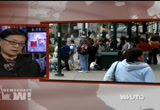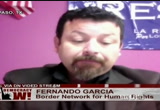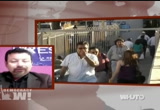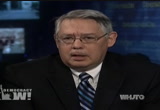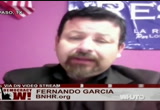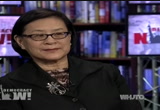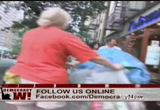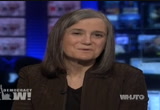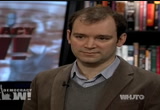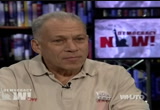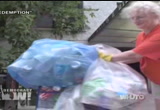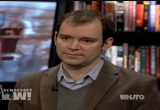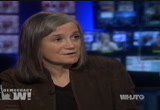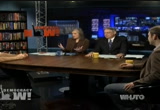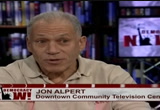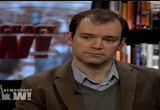tv Democracy Now WHUT January 31, 2013 6:00pm-7:00pm EST
6:00 pm
01/31/13 01/31/13 [captioning made possible by democracy now!] >> from pacifica, this is "democracy now!" >> i am here today because the time has come for commonsense, comprehensive immigration reform. >> as president obama at an immigration plan that includes a path to citizenship for some of the country's 11 million undocumented residents, deportations continue at record levels. we will go to arizona where one family was almost torn apart because of a three-year old traffic violation.
6:01 pm
>> my dad was outside and i was going to go with them to open the car, and these guys came and got him and arrested him. >> last night from 11-year-old jose arma was reunited with his father was detained two weeks ago and almost deported to guatemala. both father and son will join us today from phoenix. then, "redemption." >> i am not against the rich, i am against greed and injustice. there are more poor people here than ever before. they're all over the place. this is like everybody is down on their luck. >> a short documentary about new yorkers who survive by redeeming
6:02 pm
bottles and cans from curbs is up for an academy award. we will speak with the filmmakers jon alpert and matt o'neil. all of that and more coming up. this is "democracy now!," democracynow.org, the war and peace report. i'm amy goodman. the senate took up president obama's proposal to reform the nation's gun control laws with a high-profile senate judiciary hearing on wednesday. in a surprise an unannounced appearance, gabrielle giffords, the former congressmember badly wounded in the tucson shooting rampage two years ago, urged lawmakers to back and control. >> this is an important conversation for our children, for our community, for democrats and republicans. speaking is difficult, but i need to say something important.
6:03 pm
the violence is a big problem. too many children are dying. too many children. we must do something. it will be hard, but the time is now! you must act. the bold, the courageous. americans are counting on you. thank you. >> appearing alongside the former congressmember giffords who was shot in the head was her husband, the former astronaut mark kelly. kelly said he and giffords represented millions of gun owners to support new restrictions in the aftermath of
6:04 pm
the sandy hook massacre. >> we are both gun owners and we take that right and responsibilities that come with it very seriously. we watched with horror when the news breaks to yet another tragic shooting. after 20 kids and six of their teachers were gunned down in their classrooms at sandy hook elementary, we said, "this time must be different. something needs to be done." we are simply two reasonable americans to of said, "enough." >> also testifying was the nra head wayne lapierre, who has vocally opposed any gun control measures, including the assault weapons ban. he sparred with senator dick durbin of illinois over the issue of whether background checks -- tighter background checks could to terror and violence. go,f it imillion if you let thm
6:05 pm
you're not preventing them from getting to the next crime scene. >> that is the point. the criminals will not go to purchase the guns because there will be a background check for it will stop them from the original purchase. you missed that point completely. i think it is basic. >> as the hearing on gun control took place, another mass shooting was unfolding, this time in arizona. one person was killed, another two wounded when a gunman opened fire in an office building in phoenix. the suspect, arthur harmon, fled the scene and remains at large. he was reportedly in a dispute with the dead victim. in chicago, hadiya pendleton, 15-year-old girl, who performed at president obama's inauguration last week, has been killed in a random shooting. hshe was with a group of friends when an unknown gunman fired from nearby. she recently returned from washington where she performed with her school marching band during the in a row festivities.
6:06 pm
the push for reforming gun control comes as president obama is also seeking an overhaul of the nation's immigration laws. in an interview the spanish- language network univision, obama said he is confident both efforts can be achieved. >> i am optimistic we can get both done, both will end up generating some opposition and some strong opposition. there will be passion on both sides, but i am generally encouraged that the senate seems to have a a serious conversation about these issues. >> israel has carried out a bombing inside syria, killing two people. the syrian government says israeli fighter jets entered syrian airspace at dawn on wednesday and launched strikes. the u.s. government has alleged that israel was hitting a convoy carrying weapons for hezbollah in lebanon, as serious as the target was in fact a scientific research site. in 2007, israeli warplanes
6:07 pm
bombed a military site in eastern syria. the attack comes amidst unrelenting violence in the fight between the regime of syrian president bashar al-assad and rebels seeking his ouster. but in a sign of potential diplomatic opening, the head of syria's main opposition group said wednesday he is prepared to hold talks with al-assad's representatives outside syria of the government releases tens of thousands of prisoners. his offer marked an apparent softening of a previously held position ruling out any talks with al-assad. speaking during a visit to kuwait, the u.n. secretary general ban ki-moon urged both sides to stop the fighting in syria. >> i urge again to members of the security council to feel the sense of responsibility to humanity and history. we cannot go on like this. what is more important fact is that the primary responsibility rests with the syrian government, president al-assad. he should listen to the voices
6:08 pm
and cries of so many people. >> a court in the netherlands has ruled the oil giant shell is at least partially responsible for environmental damage from oil leaks in the niger delta. on wednesday, a dutch court ruled shell must pay compensation to a nigerian farmer whose land was contaminated by will pollution from shell's operation. the ruling was mixed as the court also threw out four other complaints. despite the dismissals, nigerian human rights lawyer and activist said the ruling establishes a precedent to hold shell accountable. >> for the first time, at least [indiscernible] that show is not a friend and needs to be held accountable for the crimes it has committed against the people. >> at least two people have died in a burst of extreme weather spanning four states. tornadoes were reported in
6:09 pm
mississippi, georgia, indiana, and tennessee on wednesday. a freak occurrence for the month of january. the storms erupted after a cold front from the arctic region clashed with warm air from the gulf of mexico. in massachusetts, democrat john kerry bade farewell to the senate wednesday following his confirmation as the next secretary of state. he will replace hillary clinton on friday. the massachusetts governor patrick has tapped william cowan as john kerry's temporary replacement until a special election is held in june. with that appointment, this and will have to get african- american members for the first time ever. those are some of the headlines read. this is "democracy now!," democracynow.org, the war and peace report. i'm amy goodman with juan gonzalez. >> welcome to all our listeners and viewers from around the country and around the world. today we look at what is been a major push a comprehensive immigration reform this week. on monday, a bar partisan group of senators announced a
6:10 pm
blueprint that includes a path to citizenship for some of the estimated 11 million undocumented people living in the u.s. president obama followed tuesday with a speech supporting the proposal. >> i am here today because the time has come for commonsense, comprehensive immigration reform [applause] we have to deal with the 11 million individuals who are here illegally. we all agree that these men and women should have to earn their way to citizenship. but for comprehensive immigration reform to work, it must be clear from the outset that there is a pathway to citizenship. >> during his address, the president also called for tougher border enforcement and a system for tracking those who overstay visas. more than 400,000 people have already been deported this year -- each year since obama has been in office. >> what president obama was speaking in nevada, an emotional scene was unfolding in
6:11 pm
neighboring arizona. over the past two weeks, and burkett activists have been organizing to reunite three u.s.-born children with their father who was recently placed in detention. as late as wednesday, edi arma was expected to be deported to guatemala because of a traffic stop in 2009. he was detained earlier this month as he went to drive his kids to school in his driveway. his 11-year-old son jose witnessed the agents from immigration and customs enforcement as they took his father into custody. >> monday morning when we were going to school, my dad was outside. when i was going to go with him to open the car, these guys came and they got him and they arrested him. [indiscernible]
6:12 pm
>> last night after a campaign led by community organizers with the group puente arizona and his son and others, edi arma was reunited with his family. he was given permission to stay and work in the country for one year, but still faces the threat of deportation. now, he and his son joined us from phoenix. we're also joined by viridriana hernandez, a dream activist who helped in the campaign. we welcome you all to "democracy now!" let's begin with jose. jose, you are 11 years old. you helped for your dad from detention. how do you feel today? >> today i feel happy that he is
6:13 pm
out and then let him go. >> edi, why were you taken into custody? how does it feel to be free after several weeks? >> [speaking spanish] >> can you translate? >> i feel happy and blessed to be here. i and proud of my son. i am extremely happy i will be with my children. >> viridriana hernandez, can you talk about the pressure campaign on the government to recognize the plight of this particular family? >> when we started organizing,
6:14 pm
we saw edi arma's case. he had no criminal record and had three children. according to these guidelines set up by the obama administration, he was a low priority case for it we said, this is what you told us. he said our community would not get deported any more if they were not criminals. edi was not a criminal. and the same day obama was making a speech about immigration, edi was about to be deported. we want to expose the lies that our community continues to be deported in high numbers on a daily basis. but getting pressure from our congressman, constituents, some making them advocate for this family and for josé and the three u.s. citizen children. >> josé, did you understand what was happening when your dad was taken in the driveway, when he was about to drive you and your sisters to school? >> well, on that day, i didn't
6:15 pm
know why they took him. i told my mom, why? they did not tell me. so i didn't understand why they took him. >> did the man tell you who they work, why there were doing this? >> no, they did not say anything. >> edi, could you talk about your time and attention? how many people were you being held with during the detention process? >> [speaking spanish]
6:16 pm
>> he is talking about when he was arrested, six and came to take him. he pleaded for them to please not arrest him in front of his children, to please take him, but not arrest and do it in front of the children. but it was useless. they went ahead and did it. he did not want his children to be traumatized and have to seek it. -- and have to see it. >> [speaking spanish]
6:17 pm
>> it was really hard to be there. the conditions in the treatment and communication was not easy. i cannot talk to my family. i was not able to let them know what was going on. i rarely communicated with them. the most frustrating thing was the fact i was not able to be with my kids and having that thought a possibly never being able to see a children again. i think that was the hardest thing. thanks to the movement and the organizations and the activists out there who helped me without knowing me, i am here now.
6:18 pm
>> viridriana hernandez, you yourself no arrests. you are one of the young dreamers. you have been arrested, even though you also risk deportation. can you talk about what is being proposed now, how it affects you, the activists, fellow students that you have been working with to change the u.s. immigration laws? >> as an undocumented student, it has been a long and frustrating process. we got deferred action, but we also need it for our community and then immigration reform. all people talk and preach about immigration reform, we see good people continue to be deported. one thing we need to advocate for is the humanity part of this. if we're serious about comprehensive immigration reform, we need to be serious about stopping the deportations. while we wait for another year,
6:19 pm
that is another 400,000 people. as an advocate and activist, we continue to fight for those things. but we also want some kind of relief for our communities in the meantime. at this point, we have put ourselves out there. we are risking ourselves. so many organizations are working these cases. we're getting united and saying we are going to do this. from the political side, we elected these people. we had a huge turnout in arizona, a door-to-door -- the turnout was more than ever before. not only is it from the after the side of having these visuals, but it is from the organizing side that we have the vote as well. >> thank you all for being with us from phoenix grid jose, especially, you are 11 years old, that you fought so hard for your dad to be freed, senior on all of the television networks,
6:20 pm
6:21 pm
>> this is "democracy now!," democracynow.org, the war and peace report. i'm amy goodman with juan gonzalez. we continue to look at immigration now, as we turn to news this week that president obama will kick off a second term with a major push for comprehensive immigration reform. obama made the announcement during a speech tuesday in nevada, a battleground states with growing latino votes who helped him win the november election. >> we have to do with the 11 million individuals who are here illegally. we all agree these men and women should have to earn their way to
6:22 pm
citizenship, but for comprehensive immigration reform to work, it must be clear from the outset that there is a pathway to citizenship. it is easy sometimes for the discussion to take on a feeling of "us" vs them. a lot of folks forget that most of us used to be them. [applause] we forget that. the foundation for bipartisan action is already in place. if congress is unable to afford in a timely fashion, i will set up a bill based on a proposal and assist they vote on it right away. >> during his address, he backed a bipartisan senate plan announced and that includes a path to citizenship for some of the estimated 11 million undocumented people living in the u.s. he also called for tougher border enforcement and a system for tracking those who overstay visas.
6:23 pm
>> to discuss what is known about the details of the plans call for this week by the president and the so-called gang of eight bipartisan senators, we're joined by three guests. in washington, d.c., lorella praeli, director of advocacy and policy at the united we dream coalition. she is just back from attending president obama's speech in person. from texas, we're joined by fernando garcia, the founding director of the border network for human rights. in new york, mae ngai, a professor at columbia university. her op-ed piece was published in the new york times yesterday called, "reforming immigration for good." >> lorella praeli, you are at the presentation, the speech by president obama and you are tweeting during the speech. could you talk about some of that? >> i was expressing mixed emotions. i was expressing a tremendous amount of excitement to hear the
6:24 pm
president just a week after his inauguration, out and talked about wanting to reform immigration and to have a clear path to citizenship for our community. at the same time, as an advocate and activist, you understand what is happening in your community right now and you understand you cannot really wait for the legislative timeline to move. there is a real sense of urgency now. it was an expression of both happiness, disappointment, and knowing the truth, knowing that while the president is speaking, people are being deported and ripped apart from their families and their communities. but again, very privileged to have been there and excited for this year. >> mae ngai, one of the things that interested me with the president not just giving a speech about policy, he tried to remind people about the history of immigration battles in the u.s. when he said that remark
6:25 pm
"most of us used to be them." you have looked extensively at the history. one of the points you have raised that most people have overlooked is the issue of defining who is legal and illegal, and how that has been used to target specific populations. >> i think in a way that was the best part of the president's speech, when he spoke to the values, what it means to be the nation's immigrant. as he pointed out, most of us used to be them, and also said that his country was built by the hard work of immigrants. i am reminded a lot of the difference between immigration at the turn of the last century and immigration at the turn of this century. in many ways that are similar. the mass migration, controlling to the anemic growth of the country's economy and culture. the main difference was 100 years ago, there were no new restrictions. when people say, "my ancestors
6:26 pm
came legally," there was not any plan to cut in front of. 98% of the people that should have been held got in. >> you talk about the visa situation because the way the numericals work right now, those countries that normally supply a lot of immigrants are automatically hitting their visa limits quickly and everyone else in stepping illegal -- everyone else in something illegal. >> that is the elephant in the room. no one has really taken up this issue. the elephant is these visa system read no country can have more than 7% of the total. that 7%, the maximum for every country, is about 25,000. four countries every year max out. you can guess are. mexico, india, china, and the philippines.
6:27 pm
when people say, "it at the end of the line," that line could be 40-years long. to tell someone to get at the end of the line is really a cruel joke. >> talk about workers, the situation for workers and the studies that have been done around them in virginia, in north carolina. >> immigrants today work in all kinds of jobs. they do not only work in agriculture anymore. they work in cities and restaurants and hotels and buildings, but also in the food processing industry. the poultry industry relieve relies on undocumented labor. there was a case in south carolina where an i.c.e. rate ended up in the deportation of all of the workers and the company resorted to prison labor to replace them. these are the kinds of jobs that businesses have on offer today.
6:28 pm
i think part of the problem -- >> they could not get local residents to take the jobs? what's not right away. they had to raise wages to get local african americans to work there. part of our problem is businesses want undocumented letter because the undocumented worker also has fewer opportunities to complain. if you complain, you get deported. a >> fernando garcia, one of the big issues and some of the differences between the senate proposal and president obama's presentation is -- and the devil in this will be in the details, what is after a decided in congress. but the senate version would require the certification that the border is secure before anybody could pass from contemporarily and the united states to being able to apply for permanent residency. i have been struck by the enormous expenditures already
6:29 pm
that the government is spending. i noted in my column this week, the federal government spent $18 billion last year on border security, which is more than the combined budgets of the fbi, marshals service, the secret service, the dea, the atf -- all of these other federal law- enforcement agencies. their total budgets for only $14 billion. we are spending a huge amount on border security already. your sense of what the president is saying on the other hand that he doesn't want to have this kind of certification, that he has already secured or wants to secure the borders in his first term. >> let's just remember [indiscernible] the border enforcement benchmark that we discussed in
6:30 pm
2006 the border has seen a buildup of enforcement. today, we have 400 miles of fencing and place, double the border patrol agents on the ground which is up to 22,000. we have deployed the national guard. as you say, we have spent billions of dollars. it seems it is never going to be enough for some people. it seems the border enforcement will always be a political tool either to oppose citizenship, especially destroy the process on immigration reform. we believe it will be unworkable. who knows who will be affected by this process? governor perry, who keeps saying were bombs exploding in el paso, or governor brewer, in arizona.
6:31 pm
i think it is really concerning we are linking [indiscernible] more deportation and militarization. >> on the issue of militarization of the border, fernando garcia, the issue of drones for example, talked about what is happening. >> we have already deployed some drones. it shows the level of militarization, but with the new proposal, they want to deploy an increase in the number of drones along the u.s.-mexico border. it will be extremely expensive. they will not be engaging with communities directly, but will show we're moving toward the militarization of the border.
6:32 pm
>> i want to ask lorella praeli about this whole issue of the details of the proposals as they come forth so far. as the president and senate proposal said, those who want to be legalized would have to learn english. but in the past, only someone who wanted to become a u.s. citizen as a requirement of citizenship had to learn english and has a civics exams. now the talk is of anyone who wants to get a green card or permanent residency would first have to learn english and has a civics exams. the migration policy institute estimates by that process there would be as many as 3.6-5 million of the 11 million undocumented who would not be able to pass that english exam. could you talk about some of the specifics like the english language requirement and how it is being applied?
6:33 pm
>> again, i think what we have seen is a bipartisan framework and we have also seen a fact sheet the administration released after the president spoke yesterday -- the day before yesterday, sorry. the devil is in the details, like you said earlier. i think we have to question the motive behind some of these principles or proposals for it to me, it is unacceptable for someone to get a green card it is a requirement that they speak the english language. that is never bent a requirement. that is a requirement if you want to be naturalized and become a u.s. citizen. you have to wonder, how long will some people be in a temporary line and this line really means being in legal limbo for an indefinite amount of time. what are going to be the triggers or the bars that will attract people in this provisional status as a way to become green card holders that will then remove them from the
6:34 pm
united states? i also want add something to this conversation on enforcement. it is disappointing to hear both the senate and the president want to leave with making or kind of uplifting this mix that our borders are not secure and been forced and has three the number one priority. i think that comes from a place of fear because american knows undocumented immigrants. america shares both neighborhoods and schools and many public spaces with undocumented immigrants, so there is this notion that undocumented immigrants are criminals and dangerous and so we have to lead with enforcement first. a really that is not a problem. the border is more secure than it has ever been before. $18 billion was spent last year. i think it is disappointing to hear that. i do think there are some key differences between the plans the president has outlined and
6:35 pm
the senate bipartisan framework. i think a lot of it has to do the different politics. on the senate side, needing to secure 60 votes and making sure this is bipartisan and republicans can feel like they can spend political capital on this, and that this is the right thing to do for democrats and republicans, especially if they consider the changing demographics in this country. and the mandate out of the elections for the some of the key principles worth underscoring are the president does not make -- the president's the bordernot say on provisions have to be met to go from temporary or legal status to a green card holders status or legal permanent resident. that is key. i would be curious to hear more from the senators working on the plan, with these triggers are going to become and how their
6:36 pm
point to measure the success. there's a real concern in the community that we are going to wait to see for the border to be secure, which is already secure, before one can become a green card holder. i think another bold move, and something our community is happy to see the president take leadership on, is making sure lgbt families are included. there are about 40,000 same-sex couples that are by national, who would benefit if there was an amendment as part of the comprehensive immigration reform that would make sure that individuals married to a same- sex -- that are in same-sex relationships would also be able to adjust their status that way. >> lorella praeli, in terms of your tweets yesterday during the president's speech in nevada, talking about the number of people who were being deported even as he spoke? >> i think it is balancing act,
6:37 pm
and i think it is really uplifting and exposing the pain. it was said earlier, it is what we did before we received deferred action, before we forced the president to deliver on deferred action with this dreamer relief program. it is something that has to continue to happen. we cannot expand all of our energy pushing for immigration reform while we know our communities are continuing to be separated, and really do to a flawed system. >> very quickly, can you tell us your own story, how you came to the u.s. and became to be a dreamer activist? >> i came to the u.s. -- actually, i lost my right leg when i was 2.5 while in peru. because of medical reasons, my treatment was in the united
6:38 pm
states at shriners hospital. my parents decided to move when i was 10 years old. i found out i was undocumented when i was graduating from high school and wanting to pursue higher education. i really got involved in the trina movement -- i think is a miracle. i consider myself to be very privileged for being a to speak out on these issues, but also to be part of a beautiful and powerful community. what the dreamer community did for me is allow me to reclaim my identity. it reminded me being undocumented is not something to be ashamed of, but to the crowd. and we ultimately define our identity and our ability to reflect change. i eventually in 2010 was very frustrated by the lack of congressional action on dream act and i called a friend, and
6:39 pm
activist, in connecticut and said, "i am ready to share my story, can you connect me to someone to help me share my story?" i was connected to the united way network and became part of a family very quickly. the international court nader invited me to the kentucky field planning meeting and said, you can only come if you promise to go back to connecticut and build something. at that moment i did not know what that commitment really mad at that moment, the field planning meeting was 200 undocumented youth and changed my life for the better. it really gave me the tools and the understanding that we define our present and future, and it is through organizing more than anything else that we achieve change. by really empowering the community and by treating the spaces for people to come out, what we're doing now with the parents and our other committee members, and really uplifting
6:40 pm
other deportation cases. >> mae ngai, going back to some of the details of immigration reform, there are two very powerful sectors in american society that have a big interests that have not thought of as much attention in this immigration reform. one is the technology, corporations, and silicon valley who have a big interest in expanding the number of technical workers and even, from what i've understand, is centrally speeding up the legalization process of any foreign student who graduates with a master's or ph.d. in science or technology, and agri business, which is still lobbying to get another form of the guest worker agricultural walker'workers admn into the bill. could you talk about those forces and what we should be watching as the debate continues on immigration reform? >> those are two sectors of the
6:41 pm
economy that the panel lot on foreign labour. in the case of technology, professional labor as well. there was a saying in the 1950's when proposals were not for immigration legislation that emphasized the recruitment of professionals, you know, no longer, "it in your tired and huddled and masses, give us your ph.d.'s." in many ways it addresses the failures of public education in this country and the needs of business. the senate agriculture. agriculture could be a living that many people could make in this country. it is not necessarily something that americans won't do, it is because the wages are so low and the conditions are so poor and growers shy away from mechanization because it is cheaper for them to use the
6:42 pm
immigrant labor, especially undocumented labor. these are issues that should be on the table. but i think one of the things that it suggests to us is that should immigration only be about what business wants? the rush to the forefront of these particular sectors is part of that phenomenon. people think, immigration should be something that serves america well, it is, but it is also something that serves the immigrants themselves. as long as we look at it only from the vantage point of business, we're going to be a lot of trouble because business only cares about one thing, and that is their bottom line. they don't really care about the other social and economic costs that come with a kind of immigration stance they want. >> what about protection issues for both of these sectors? a lot of workers who come here from a professional workers to come here, they visit to one
6:43 pm
company, therefore, their ability to be able to raise issues in the workplace or defend their rights becomes more difficult if the company controls there be sent into the country. >> there are many restrictions. they can bring a spouse, but the spouse cannot work. they cannot quit, really, not that they cannot complain, they cannot quit. this problem i think will come up with the issue of temporary work visas. that is another plan republicans have floated. it is not clear if the white house supports this or not. we have a lot of experience in this country with guest worker programs. i think the issue gives us pause. the problem with temporary labour visas is if the -- the employer holds the be set, then the worker really has no rights at all. if you say, "he did not hany" --
6:44 pm
a locked -- yous all ligh are sent home. he cannot quit. we all understand in this country that the quintessential thing of being a free labor is the right to quit as long as -- as well as the right to organize. you cannot get that the temporary labor visa. >> fernando garcia, how are you being consulted on the border about what you want and what you feel would be a rational policy? the border governors, as they're known, are given tremendous power. >> we have been engaged in multiple conversations both with the white house and members of the senate. some are members [indiscernible] we believe no more border enforcement is needed. much less winning border
6:45 pm
triggers. we believe when you work and live at the border, you see the consequences of militarization. in the last few years we had eight police shootings by border patrol and immigrants had been killed. it was a civil rights and human violation not affecting only the immigrants, but border residents. we have proposed that we welcome the discussion, that this historic announcement on citizenship did not happen before, but at the same time we want to change the approach on enforcement. we need a different vision on enforcement. we need to make those accountable, balanced. we have the largest enforcement operations in the nation, which is immigration enforcement, not
6:46 pm
just on the border but the interior, with no independent oversight mechanisms di. the senators and the president, there are some sections that talked-about more training for border patrol, issues about limiting the so force or racial profiling issues [indiscernible] there are some things we worked on in the past few years, but more needs to be done about having an oversight process, more training and have a process established. >> fernando garcia, you mentioned you have had discussions with people in the white house. the obama administration is well known for trying to whip activists into line behind their policies, and basically
6:47 pm
tolerating very little dissent or pressure from the activist community. i am wondering what your senses on how they're dealing with the immigration issue? >> we don't know the details yet of what is the proposal coming from the president. we have expressed many concerns about having more enforcement even the president putting on the table more and forced not only on the border, but the interior and workplace. that is one of the major elements and the legislation proposed both by the president and the white house where everybody will be the would-if you look for a job, you will be run through [indiscernible] now, but also in the past about staying away from this idea that we need to have a
6:48 pm
buffer criminalization policy against immigration. we are making progress. we're having a dialogue with the white house and the senate, but we're putting pressure on some decisions that are not going to work. at the end of the day, some of our organizations and our communities are not willing to trade off border enforcement or have legalization at any cost. >> we want to teach you all for being with us, fernando garcia, with the border that were for human rights, speaking to us from texas, lorella praeli with united we dream coalition was at president of his speech yesterday, now in washington, d.c. new professor mae to ma ngai. when we come back, an oscar- nominated short documentary called "redemption."
6:50 pm
6:51 pm
the film is called "redemption" and its nominated for an academy award in the documentary shorts category this year. it's about a large group of people who survive redeeming bottles and cans they collect from curbs, garbage cans and apartment complexes. here is a clip of the film. >> i am not against the rich, i am against greed and injustice. that is what i am against. there are more people here than ever before, all over the place trying to make a dollar, you know? everybody is down on their luck, man, just about. >> a clip from the film "redemption." for more we're joined by the film's directors, jon alpert and matt o'neil. there were nominated for academy award for the film "time as a natural disaster," in 2010. there were on the oscar short
6:52 pm
list last year for "in tahrir square." the work together downtown community television center, dctv. jon alpert has won many awards. jon alpert and matt o'neil, welcome to "democracy now!" tell us about "redactions." >> you live in new york city. i think we all tend to walk on the street and people are going through our garbage and sort of land and we do not look them in the eye or talk to them. one day, she let evans of hbo was walking past her garbage and saw someone was up earlier than she was, working harder than she was, and she wondered who these people were. >> it is amazing. where the daily news used to be on 33rd street, around 11th avenue, is some slight grand
6:53 pm
central station for redeemers. there are a huge number of people. most new yorkers never really attention to the lives of the people involved or how they got there. >> it is an army on our streets because of all of the jobs they used a half. when your done at the firehouse, the surrounding buildings in china were made of sweat shops. people made things. they are gone. >> i want to turn to one of the can collectors the feature in the susan. she's a former computer sales executive with a college degree. >> i am slow at this. when i first guarded, i hope nobody saw me that i knew. how're you doing? in this area, there is a lot of
6:54 pm
young people, people with good guys with thehe money. i received a bachelor of science and then i got into the computer industry. i worked with microsoft, comcast, i was once considered one of the most prestigious award in industry the time in 1990, i was one of the winners of the ibm's winner's circle, which was given to 20 of the top sales and marketing people in the country. and out and helping keep the city clean. >> a clip from "redemption." matt o'neil, tell us where susan is today and some of the other people you profiled? >> shias still working on the street, collecting cans but susan is lucky enough to be living in atlantic city, and
6:55 pm
housing. that was her goal. she just got priced out of new york. she was a new yorker all her life. without a subsidy, she was not able to afford to stay here. you play a clip earlier from president obama saying before we were "us >> we were them, and i think that is something we need to pay to a -- tension to. these are men and women just like you and me that slipped through the >>. as we were making this film and you see it, the men and women who are not collecting cans do not make eye contact with the men and women collecting cans for they walk right by time and again and never engaged read these our fellow citizens. it is happening all around the country. >> there are a lot of immigrants as well that you profiled, families collecting bottles. talk about the process and where people live. >> when i started this, i thought was going to be mostly
6:56 pm
homeless people working on the streets. it turns out most of the can collectors are the working poor. he have one who is supporting four kids in sunnyside queens with her can collecting. she drops her kids off at school before she collects cans, then spends the entire night sorting cans with her husband. lilly used up a job in chinatown, which is still suffering from the effects of the world trade center. this restaurant jobs are still gone. she used to work in a restaurant. shias on the street 20 hours a day working. you cannot find a boss -- she never stops. she got ran jon and i when we were trying to fill her request is a science how the massive number of cans are balanced on shopping carts as they walk through the streets. where did they bring them to? >> the recycling centers, any place that sells a bottle is supposed to redeem them.
6:57 pm
lots of places are not happy to have lots of people dragging clanking banks through their while other people are trying to buy toothpaste. it is very difficult for people to redeem. that is the hardest part of their job. the may redemption center in chinatown was destroyed by hurricane sandy. this really put a lot of pressure on these very marginal vulnerable people and some have become homeless as a result of it. >> and their viewpoint of how the rest of the city treats them, especially the owners of these buildings and when they go in from of -- is one thing in public, but when you go to the trash of a private building, you can go through conflicts with the landowners or supers. >> they have to be very friendly, especially with the supers. if you can score a big building and get access to that before the others can, that is money in your pocket. that is also part of their job.
6:58 pm
it is competitive. if they're collecting cans for "democracy now!" and they're sick one day, someone else will, take those cans away. >> what we must surprised about? >> as a documentary filmmaker, i have gone over the world. it is almost a cliche where we go, as reporters, you had to the dump. there's a documentary made about the dump in egypt. i went to the smoking mountain in the philippines and as reports were part of the pushing the regime out because of inequities they showed. and to see this in my own country? shocking. we have an army of people who grew through the garbage. i still get chills when i think about it. >> thank you for being with us. the award winning directing to go, their latest on "redemption" is academy award domination in
109 Views
IN COLLECTIONS
WHUT (Howard University Television) Television Archive
Television Archive  Open Access
Open Access  Television Archive News Search Service
Television Archive News Search Service 
Uploaded by TV Archive on

 Live Music Archive
Live Music Archive Librivox Free Audio
Librivox Free Audio Metropolitan Museum
Metropolitan Museum Cleveland Museum of Art
Cleveland Museum of Art Internet Arcade
Internet Arcade Console Living Room
Console Living Room Open Library
Open Library American Libraries
American Libraries TV News
TV News Understanding 9/11
Understanding 9/11
